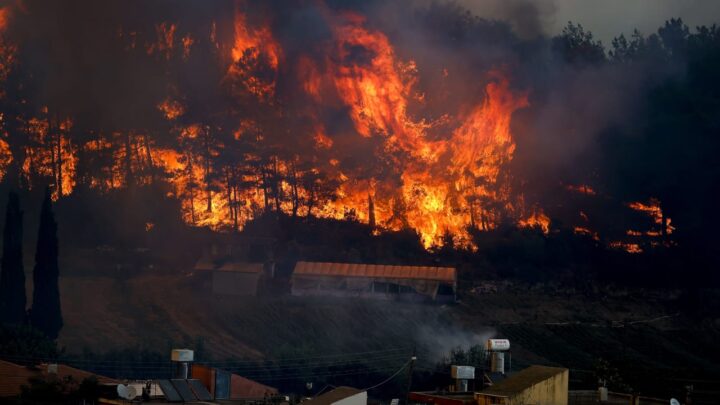Donald Trump
In the complex and often perilous world of international relations, the actions of world leaders reverberate far beyond their borders. A recent string of policy statements from President-elect Donald Trump — remarkably addressing the annexation of Canada, Greenland, the Panama Canal, and even the renaming of the Gulf of Mexico — raises a chilling question: Is this a personal ploy to reshape the world map, or is it part of a larger, premeditated strategy to justify Russian President Vladimir Putin’s ongoing war on Ukraine?
Trump’s rhetoric on these geopolitical matters, though seemingly outlandish to some, holds an undeniable gravity. From his assertion that Canada should become the 51st state to his bizarre call for a “forced” annexation of Greenland, Trump’s statements not only challenge international norms but also introduce the disturbing idea that the United States can unilaterally redraw borders and impose control over sovereign nations. His remarks on the Panama Canal, a vital global artery once under U.S. control, suggest a longing for imperial dominance while dismissing the international community’s recognition of territorial sovereignty.
At the heart of these statements lie an underlying narrative of expansionism, one that seems eerily aligned with the rhetoric coming out of Moscow. Putin, in his quest for imperial restoration, has shown no hesitation in using force to reassert Russia’s dominance over former Soviet territories. This includes the 2014 annexation of Crimea and his most recent invasion of Ukraine — a war that, according to some analysts, is driven not only by regional security concerns but by a deep-rooted desire to restore Russia’s former glory.
A Dangerous Parallel
Advertisement
So, what connects Trump’s fantasy of annexations to Putin’s brutal aggression in Ukraine? On the surface, Trump’s proposals might appear to be little more than provocative, attention-grabbing soundbites. However, the underlying message is more insidious. Trump’s frequent flirtation with the idea of “taking” territory — whether it be through annexations or outright conquest — echoes the same imperialist tone Putin has used in justifying Russia’s actions in Ukraine. While Trump has not explicitly called for military action, his remarks suggest an affinity for a world where borders are not respected and the powerful simply take what they want. In this sense, his statements serve as a dangerous legitimization of aggressive expansionism.
Putin’s justification for invading Ukraine has been cloaked in historical revisionism and a desire to restore Russia’s former imperial might. In 2022, Putin called the dissolution of the Soviet Union, “the greatest geopolitical catastrophe of the 20th century,” and he has consistently described Ukraine as an artificial state that must be reunited with Russia. Similarly, Trump’s apparent willingness to challenge international norms by advocating for territorial acquisitions reflects a mindset that borders are fluid, and that might makes right. Both leaders, in their rhetoric and actions, echo a belief that the status quo is unacceptable and must be overturned.
A New Age of Imperialism?
Advertisement
Trump’s remarks on Canada, Greenland, and the Gulf of Mexico might be dismissed as the musings of a former reality TV star-turned-politician. Yet, they hint at a deeper, more unsettling ideology. Trump’s vision of American expansion — whether through economic, political, or military means — mirrors a broader global trend toward aggressive nationalism and territorial revisionism. This attitude could embolden authoritarian leaders like Putin, who view the sovereignty of other nations not as a norm to be respected, but as a barrier to be dismantled.
The alarming rise of populism and nationalism in both the United States and Russia suggests a convergence of dangerous political ideologies. Trump’s rhetoric not only mirrors Putin’s, but may, in a more subtle way, serve as a precursor to justifying military aggression. Putin’s war in Ukraine, which has already resulted in tens of thousands of deaths and displaced millions, could be seen as a manifestation of the very attitudes Trump is flirting with. If the world’s two largest nuclear powers are both entertaining the idea of forcibly annexing territories, what message does this send to smaller, vulnerable nations?
The Risk of Undermining Global Order
Trump’s proposed annexations, particularly in a post-Ukraine world, risk undermining the international order that has largely kept peace since the end of World War II. The concept of sovereign borders — the idea that no nation has the right to arbitrarily seize another’s land — has been a bedrock of global diplomacy for generations. Trump’s rhetoric chips away at this principle, introducing a sense of instability where none should exist. More than a mere political stunt, these proposals represent a philosophical challenge to the very structure of international law.
Advertisement
What is even more concerning is the potential impact on global alliances. Trump’s seeming indifference to the sovereignty of other nations and his apparent disregard for international diplomacy may alienate allies and embolden adversaries. If annexations, whether through rhetoric or policy, become normalized, we risk entering a new era where the rule of law is supplanted by the whims of powerful leaders, willing to rewrite the map with little regard for the lives and livelihoods of the people they displace.
The Road Ahead: A Call for Accountability
As President-elect Trump prepares to take office, it is crucial that both American and international leaders confront these ideas with a clear-eyed understanding of the dangers they pose. These aren’t just careless words from a man seeking to dominate the political discourse — they are dangerous signals of a mindset that could reshape the global order in ways that threaten peace, stability, and security.
If the West, led by the United States, is to maintain its commitment to democratic values, it must unequivocally reject the rhetoric of territorial conquest. Supporting Ukraine’s sovereignty and territorial integrity in the face of Russian aggression is more than a moral imperative — it is a critical safeguard for global peace. Similarly, the world must stand firm against any attempts to legitimize the kind of expansionist rhetoric that Trump has put forward.
Advertisement
Trump’s policy proposals, when examined closely, serve as a stark reminder of how easily aggressive nationalism can slip into dangerous imperialism. In our rapidly changing world, where the boundaries of global power are constantly in flux, we must not lose sight of the principles that have guided peaceful coexistence for decades. For the sake of our future, we must ensure that these principles hold firm — no matter who is in power.
Dike PhD writes from Canada. He is a college professor and host of a popular weekly podcast in Calgary, Canada. Dr. Dike graduated from Delta State University, Abraka, with a Bachelor’s degree in Economics. He later earned a Masters degree in Petroleum Economics from the University of Dundee, Scotland, and a Doctorate degree in Economics from the University of Stirling, Scotland. He previously worked with the World Bank and Nigeria’s National Assembly.
Advertisement
Views expressed by contributors are strictly personal and not of TheCable.










